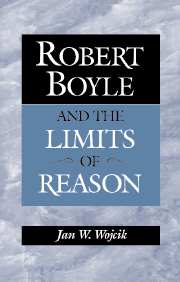Book contents
- Frontmatter
- Contents
- Preface
- Acknowledgments
- Introduction
- Part I The Theological Context
- 1 Things above Reason: Medieval Context and Concepts
- 2 The Threat of Socinianism
- 3 Predestination Controversies
- 4 Theology and the Limits of Reason
- Part II The Context of Natural Philosophy
- Conclusion
- Bibliography
- Index
1 - Things above Reason: Medieval Context and Concepts
Published online by Cambridge University Press: 24 November 2009
- Frontmatter
- Contents
- Preface
- Acknowledgments
- Introduction
- Part I The Theological Context
- 1 Things above Reason: Medieval Context and Concepts
- 2 The Threat of Socinianism
- 3 Predestination Controversies
- 4 Theology and the Limits of Reason
- Part II The Context of Natural Philosophy
- Conclusion
- Bibliography
- Index
Summary
When confronted with the charge that the doctrine of Christ's Incarnation was irrational, the African Church Father Tertullian (c. 160–c. 220) cheerfully responded, “And the Son of God died; it is by all means to be believed, because it is absurd. And He was buried, and rose again; the fact is certain, because it is impossible.” It is likely that his claim was based on a passage in Aristotle's Rhetoric, where Aristotle explored a position that could be taken in response to the charge that certain beliefs are incredible: “We may argue that people could not have believed them if they had not been true or nearly true: even that they are the more likely to be true because they are incredible.”
Most likely, with his “I believe because it is absurd,” Tertullian meant nothing more than that the objects of faith, even if incomprehensible to human understanding, are by virtue of their being revealed most certainly true. As Étienne Gilson observed in commenting on this passage, “Ever since the time of Athenagoras, theologians have been most anxious always to establish at least the rational possibility of the Christian faith.” This anxiety led to the claim that although some Christian doctrines may be above reason, none are contrary to reason, a claim that had become a commonplace expression by the seventeenth century. “Above but not contrary to reason,” however, has meant different things to different Christian thinkers at different times and in different contexts.
- Type
- Chapter
- Information
- Robert Boyle and the Limits of Reason , pp. 27 - 41Publisher: Cambridge University PressPrint publication year: 1997



